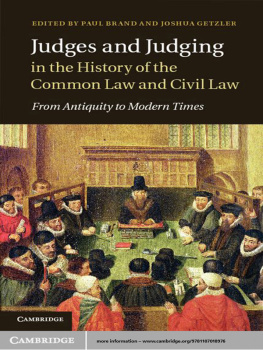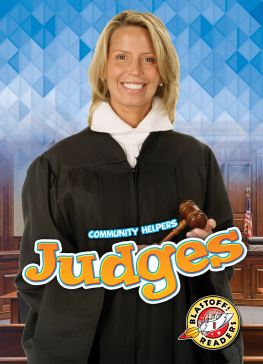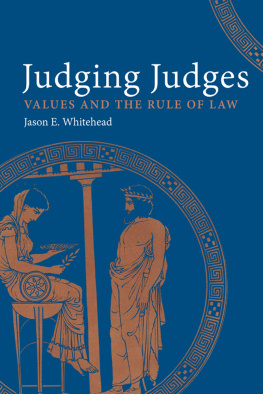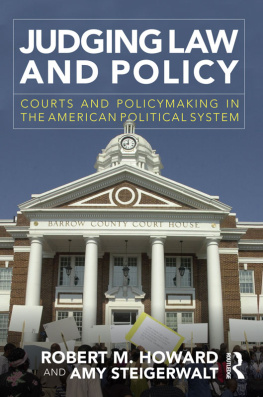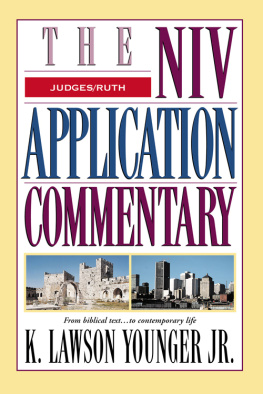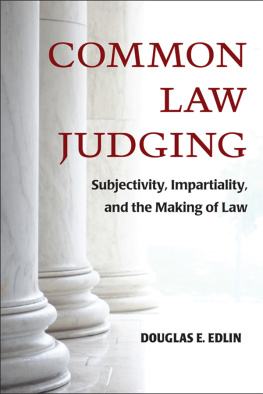Judges and Judging in the History of the Common Law and Civil Law
In this collection of essays, leading legal historians address significant topics in the history of judges and judging, with comparisons not only between British, American and Commonwealth experience, but also with the judiciary in civil law countries. It is not the law itself, but the process of law-making in courts, that is the focus of inquiry. Contributors describe and analyse aspects of judicial activity, in the widest possible legal and social contexts, across two millennia. The essays cover English common law, continental customary law and ius commune , and aspects of the common law system in the British Empire. The volume is innovative in its approach to legal history. None of the essays offers straight doctrinal exegesis; none takes refuge in old-fashioned judicial biography. The volume is a selection of the best papers from the 18th British Legal History Conference.
PAUL BRAND is a Senior Research Fellow at All Souls College, Oxford and Professor of English Legal History in the Faculty of Law, University of Oxford.
JOSHUA GETZLER is a fellow and tutor at St Hughs College, Oxford and Professor of Law in Legal History in the Faculty of Law, University of Oxford.
CAMBRIDGE UNIVERSITY PRESS
Cambridge, New York, Melbourne, Madrid, Cape Town, Singapore, So Paulo, Delhi, Tokyo, Mexico City
Cambridge University Press
The Edinburgh Building, Cambridge CB2 8RU, UK
Published in the United States of America by Cambridge University Press, New York
www.cambridge.org
Information on this title: www.cambridge.org/9781107018976
Cambridge University Press 2012
This publication is in copyright. Subject to statutory exception and to the provisions of relevant collective licensing agreements, no reproduction of any part may take place without the written permission of Cambridge University Press.
First published 2012
Printed in the United Kingdom at the University Press, Cambridge
A catalogue record for this publication is available from the British Library
Library of Congress Cataloguing in Publication data
Judges and judging in the history of the common law and civil law : from
antiquity to modern times / edited by Paul Brand and Joshua Getzler.
p. cm.
Includes bibliographical references and index.
ISBN 978-1-107-01897-6 (hardback)
1. Judges History 2. Judicial process History. 3. Judicial review History.
4. Courts History. I. Brand, Paul, 1946 II. Getzler, Joshua.
K2146.J82 2012
347'.0109dc23
2011037679
ISBN 978-1-107-018976 Hardback
Cambridge University Press has no responsibility for the persistence or accuracy of URLs for external or third-party internet websites referred to in this publication, and does not guarantee that any content on such websites is, or will remain, accurate or appropriate.
Preface
More than 200 legal historians, from every corner of the globe, met in Oxford at the Eighteenth British Legal History Conference in early July 2007 to hear and present papers on the history of judges and judging. A selection of the papers presented at the conference has now been revised and edited to form the chapters of this volume. Perhaps the theme of the conference and of this publication needs some initial explanation. The legal realists of the 1920s and 1930s rightly questioned the pre-eminence given to the study of decision-making in the courts in American legal education, and similar ideas have entered British and Commonwealth legal education in the past generation; the utterances of judges are not taken as the sum of, or even the core of, the law. But this is hardly news for legal historians. They have long been effortless, even naively unselfconscious, realists, always concerned to understand the making of the law within the context of its time, with due attention to the society in which law is embedded and the shifting mentalities of professionals and other players in the legal system. Legal historians have not tended to regard law as the process of technocratic development in courts of timeless truths. The chapters of this book bring to bear legal historical analysis of the highest order to describe aspects of judicial activity, in the widest possible legal and social contexts, across two millennia. The essays cover English common law, the Continental customary law and ius commune , and aspects of the common law system in the British Empire. It is noteworthy that just as none of the authors have offered traditional doctrinal exegesis, so none have taken refuge in the conventional limits of judicial biography.
The opening chapter by Paul Brand uses a variety of original sources to shed new light on the early development of the English common law judicial system. He discusses the revolutionary change which took place in later twelfth-century England: the creation of a new type of royal justice sitting as part of a group of justices in new royal courts whose authority derived from a direct relationship to the king who appointed them and to whom they gave an oath of faithful service and who granted them special authority to wield judicial power in each case where jurisdiction was exercised; who united in themselves the formerly separate roles of presiding in the court and making judgments there; and whose judgments were for the first time regularly recorded in writing. He then demonstrates, how over the course of the thirteenth century, the multiplication of available sources allows us to see in ever closer focus the ways in which judges judged in the new courts and their role in guiding the pleading of cases and in directing and questioning juries and in making judgments. He also shows how the new sources allow us to pierce the normal veil of collective judicial anonymity to glimpse the role of smaller groups of justices within courts and of the role of outsiders within the judicial process.
In his chapter David Seipp discusses the arguments about the nature of corporations made in a dozen reported cases heard between 1478 and 1482. He sees those arguments as belonging generically (in modern terms) to one of two camps: either a formalist one (which sees corporations as wholly separate from the individuals who comprise them) or a realist one (which pierces the veil of corporate identity to see and take account of the particular individuals who comprise them). He also looks at the possible intellectual roots of the formalist position within theology and canon law and prior English politics and practice. He finds that individual serjeants and justices who participated in these cases were not, in general, consistent in the camp to which they belonged from case to case, and notes that this suggests that neither group invested their own individual personalities or intellectual convictions in the performance of their professional duties.
Ian Williamss chapter looks at the development of a theory of precedent amongst English judges during the period from the sixteenth century up to the Civil War. He asks why judges by the mid seventeenth century had come to see reported case law as binding, whilst their predecessors a century earlier most emphatically did not. He suggests that the results of cases as shown on the record had long been regarded as having binding force, but not the reasoning by which judges had reached for those results. After all, reported rationes were often distorted or fabricated in contemporary or subsequent reporting. Matters changed as modern claims were brought in more informal guises, such as the actions on the case. Omnibus writs like these made the accompanying narrative of the claim into part of the courts reasons for giving or denying a remedy. This move to a freer narrative of facts helped the courts see the whole case as precedential, in contrast with the older law where counsel and judges were busy in debating how the pleading of stylised facts activated a particular form of action.


